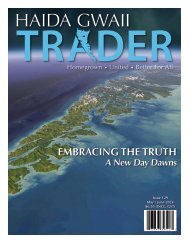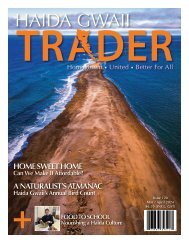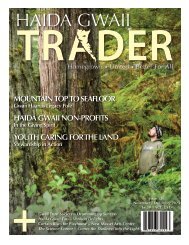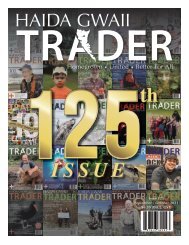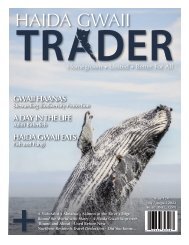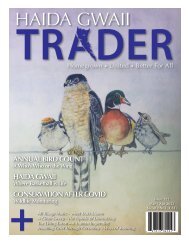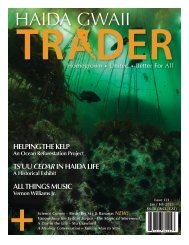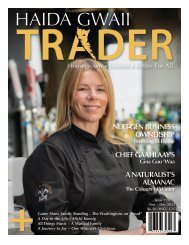HGT Magazine #115 January/February 2022
Haida Gwaii articles, local business information, events, classifieds including real estate ads.
Haida Gwaii articles, local business information, events, classifieds including real estate ads.
You also want an ePaper? Increase the reach of your titles
YUMPU automatically turns print PDFs into web optimized ePapers that Google loves.
Dirt Nerd Soil Company
Composting on Haida Gwaii
By Emily Peer-Groves
It has been just over a year since Dirt Nerd Soil Company
launched their pilot community compost collection program
on the south end of Haida Gwaii. Their burgeoning
compost pile is now fed with inputs from Masset and Gaw
Tlagee Old Massett as well. The pilot project has turned
into a permanent service. You may have seen the green or
white buckets around your community.
Since their start, the Dirt Nerd folks have been working
on building infrastructure to process compost and manufacture
high-quality soil blends. Right now this includes
a worm composting facility, a small greenhouse, a food
waste shredder, and an ever-growing aerobic compost pile.
Ultimately, the main purpose of Dirt Nerd lies in promoting
food sovereignty through soil fertility, to not just compost
but to create a dynamic and balanced food source for plants
and microbes. The vision is for all of Haida Gwaii’s gardens
to have the soil resources to produce at their best capacity,
whether the soil is sandy or clayey, or whether the gardeners
are experienced or not.
The “dirt nerds,” Christina Jewell and Emily Peer-Groves,
deeply cherish the opportunity to be living and working on
Haida Nation land. Christina and Emily were friends while
both attending the University of British Columbia (UBC),
and serendipitously met again on Haida Gwaii in September
of 2020. Emily was born in Bangkok, Thailand, and grew
up in Connecticut until she pursued an undergraduate
degree in Applied Biology from UBC, with a focus on plant
and soil science. She came to Haida Gwaii for the Haida
Gwaii Institute semester program in January 2020, but when
COVID-19 abruptly ended her classes she decided to stick
around after graduation, feeling inspired by the strength of
the community and mesmerized by all the moss. Christina
grew up in Toronto and moved to Vancouver in 2014 to
attend UBC. After taking a class on vascular plants just out
of curiosity, she was hooked, and switched to study plant
and soil sciences. She moved to Haida Gwaii in 2019, and
after a wonderful year of learning and exploring, embarked
on this dirt journey with Emily.
Throughout much of 2021, many residents of Haida Gwaii
tuned in to a series of incredible food sovereignty webinars
under the Haida Gwaii Food Strategy banner. At one of
those events, the Dirt Nerd entrepreneurs learned about
the growing demand for soil in Haida Gwaii communities,
and the great expense of having it shipped to the islands.
It was clear that there was a need for making soil using
locally available ingredients. For the next three days Emily
and Christina furiously brainstormed. They saw that Haida
Gwaii is a place with an abundance of inputs that would be
perfect for composting. Mike Racz of Haida Gwaii Community
Futures then agreed to partner with them, and offered
his rock quarry as their composting site. The seed for Dirt
Nerd Soil Co. was planted.
One of Emily and Christina’s favourite professors at UBC
once said that, “dirt is the grime under your fingernails,”
and should not be used to describe soil, the fertile and
beautiful stuff where things can grow. However, the word
dirt was used in the business name because it’s humbling to
remember that we all rely on the less glamorous stage of life,
decomposition, to bring forth the wonderful parts of life.
Soil is one of the most important natural resources on our
planet. It is the foundation upon which all terrestrial plants
grow. It provides us with food, fibre, and fuel. Soil also plays
a huge role in filtering water and protecting biodiversity,
as well as mitigating and adapting to climate change. In
soils, carbon can be stored in the form of organic matter,
removing it from the atmosphere. Composting is all about
the production of organic matter.
Essentially, composting is controlled decomposition. Fungus
and bacteria do most of the heavy lifting. They facilitate
the decomposition of waste and transform high-energy
compounds into low-energy compounds that are biologically
stable in the soil. Raw organic waste materials,
like your food scraps, are transformed into these stable
substances in two phases: the active phase, and the curing
phase. In the active phase, also known as the thermophilic
phase, temperatures rapidly reach as high as 65°C (150°F),
enough to kill pathogens and weed seeds. The curing, or
mesophilic phase, results in a cooling off until temperatures
drop to about 38°C (100°F), and oxygen consumption slows.
Mesophilic microorganisms re-inhabit the pile, continuing
decomposition.
The Composting Process
To create their compost, Dirt Nerd first starts with the right
ratio of “greens” and “browns,” or nitrogen-rich (green) and
carbon-rich (brown) components. This usually looks like
food scraps for the greens and alder chips or white wood
sawdust for the browns. They then grind everything in a
chipper mulcher machine they bought from Echo Bay Tool
Rentals in Daajing Giids Queen Charlotte. This glorious
mush is then heaped into a pile for mother nature to begin
the compost process.
Once the compost has cured for six to eight weeks, the Dirt
Nerd folks sift it and then feed it to Red Wiggler worms,
Eisenia fetida. These worms contain tens of thousands of
species of bacteria, fungi, and yeasts, as well as hormones
and enzymes in their digestive tracts that are then passed
into the soil. The worms are kept in towers of stacked totes
and carefully monitored in a climate controlled environment.
Worm castings have about seven times the amount
of nitrogen, and five times more phosphorus and potassium
than regular topsoil. They also help plants fight off disease
and pests because they contain high levels of chitinase, a
natural insect repellent.
“It’s humbling to remember that we all rely on the less glamorous stage of
life, decomposition, to bring forth the wonderful parts of life.”
- Christina Jewell
Christina Jewell (L) and Emily Peer-Groves (R), with part of their compost pile
24 HG January / February 2022 25



